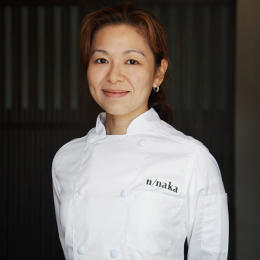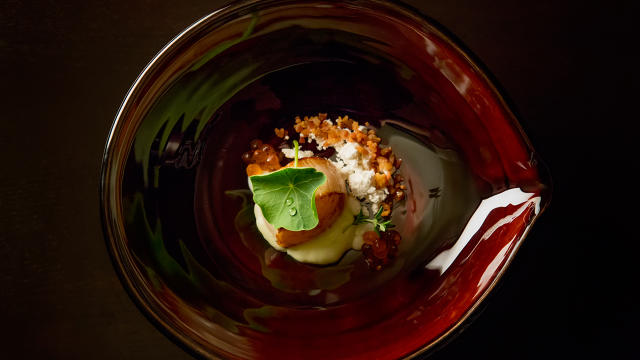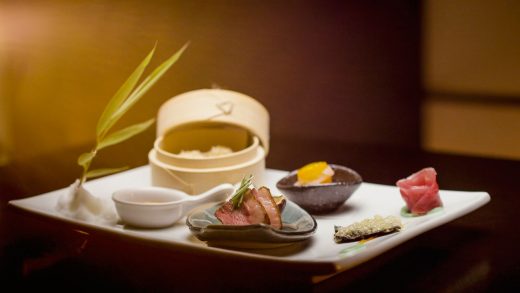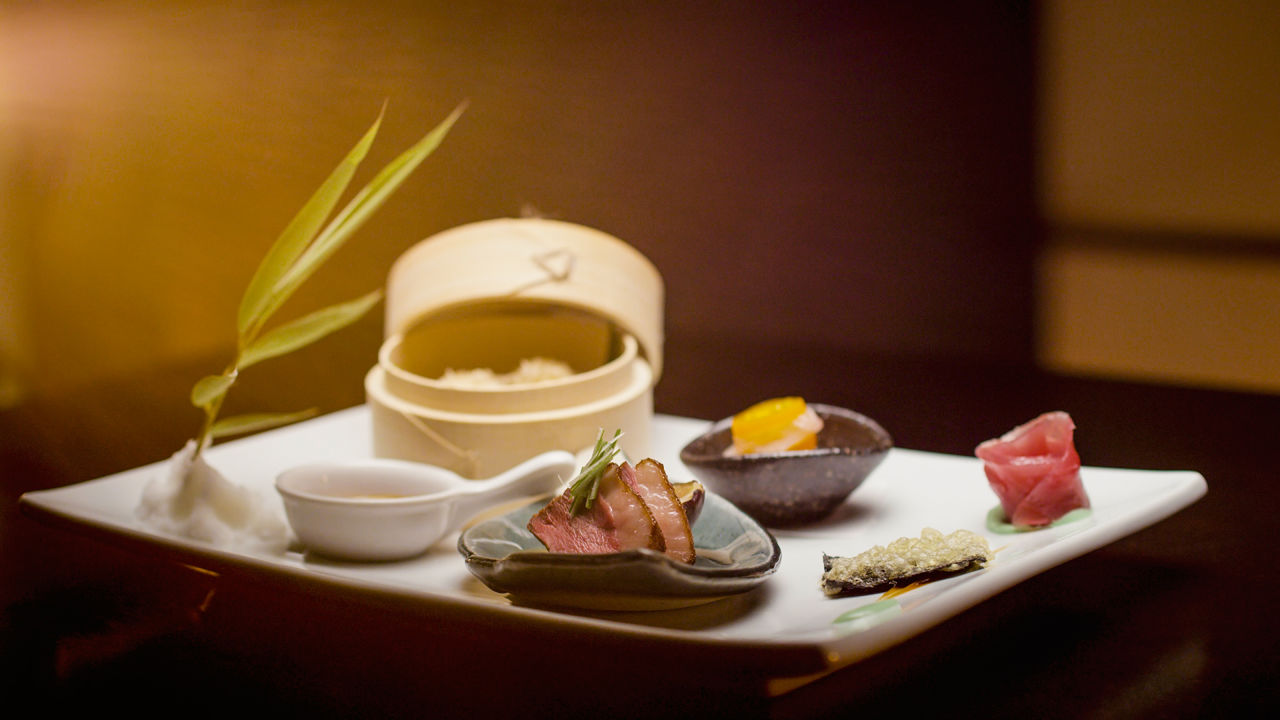This Chef’s Ambitious Menu Is A Model For Creative Reinvention
Even before she was one of the first chefs to be spotlighted in the Netflix series Chef’s Table, before she put her name on n/naka, the award-winning culinary landmark restaurant in the Palms neighborhood of West Los Angeles, chef Niki Nakayama stood out.
After studying at the Southern California School of Culinary Arts, Nakayama worked in the kitchen at the sushi restaurant Takao in Brentwood where—as female sushi chefs are such a rarity—her presence drew attention. But it wasn’t always positive.
In her Chef’s Table episode, for example, her former employer Takao Izumida remembered her with an interesting descriptor: as the restaurant’s “mascot.” She also remembers frustrating experiences at her first restaurant, the sushi cafe Azami, which she opened in 2000 and ran for eight years before selling it. Sometimes, Japanese men would walk in, see her behind the counter, and immediately leave.

No wonder this was the headline for a 2013 Los Angeles Magazine piece about her: “I’m a female sushi chef. Get over it.”
She’s a lot more than that. Nakayama is known for being one of the only female chefs focused on bringing a modern touch to kaiseki cuisine. At n/naka that means 13 courses involving a progression of flavors, textures, and cooking methods.
Nakayama burned out at her first restaurant because of the somewhat stifling nature of preparing sushi. She wanted freedom to experiment without being constrained by the expectations people bring to sushi. Today, at her 26-seat restaurant—as serene as a spa with dark wood floors and white walls—she’s as much a chef as an artist in pursuit of the sublime.

She prefers the focus to be on the food, which is why she cooks at n/naka behind a screen, away from view. And Nakayama makes sure customers who come back don’t get served the same thing twice. Those hoping to get a taste have to make a reservation about three months in advance.
Here, she talks with Fast Company about what being one of LA’s most celebrated chefs has taught her about creativity, and how she’s dealt with the highs and lows of the profession.
Fast Company: How did you get started as a chef?
Niki Nakayama: Before I started at culinary school, I was in Japan for the summer and staying with my aunt and uncle, and they had this inn. I was sort of helping out. I was 19. I really, really enjoyed being in the kitchen, just doing the detailed work. I thought that was so fun. At that point in my life, I was kind of lost. I wasn’t really sure what direction I wanted to take. And then all of a sudden, it’s like when you happen to get this inspiration or epiphany—it was like, I should go to culinary school.
I came back to the States and decided to go to culinary school, but there were doubts along the way. I remember telling my mom, and her initial reaction was: ‘You’re too short! You’re too small! It’s a tough life! This is not the kind of life you want.’ And I was like ‘No, no, this is good for me. I think this is what I want.’
But I still remember the first day, they had us cutting carrots. And I still remember thinking, ‘What am I even doing here?’ There was a little moment of doubt. But as I went along and did more, I really enjoyed it. As I went through the year, everything just felt so right.
I was lucky enough to land a job at Takao restaurant in Brentwood. A sushi restaurant. [Takao Izumida] has always been very open. He’s never felt like he shouldn’t teach me things. He’s always been very helpful. He gave me everything he could during the time I worked with him.
But you felt stifled and ultimately got burned out when you had your own first sushi restaurant?
The opportunity came where I could open my first restaurant with my cousin. We opened a sushi restaurant and had it for eight years, and it was a really wonderful experience. But the whole time, I was dreaming that one day, I would have this place where I would just serve the food I wanted that was very personal to me. And it wouldn’t be just sushi, but a whole entire meal. Because I really enjoy all the aspects of cooking.
Sushi is wonderful for people who love the technique and every aspect. I love the variety of different things and so, after eight years, I was ready to call it quits. I was so tired. I was kind of feeling lost. I didn’t feel excited by cooking anymore. So I was just going to take a little break. And then it just so happened this n/naka spot came about.
I’d always wanted a place like this. And I was like, ‘Okay, I guess this is a good thing.’ But it was going to take two to three years to complete the project because of permits and everything with L.A. So in between, I thought, I’m not going to do anything.
I remember driving listening to NPR about this restaurant Talula’s Table (in the Pennsylvania town of Kennett Square) that was, like, one of the hardest restaurants to get into. They were talking about how the chef had come from the city and moved back to the countryside and done this tasting menu and I was like, ‘That’s exactly what I’ll do! I’ll do that in this new space, and try all these ideas I have.’ [Azami] (her first restaurant) definitely prepared me for this, though. Had it not been for that, this place would have been a lot harder for me.
How do you carve out the space in your life to be creative when you also have to deal with the responsibilities of owning and running a restaurant?
Me and my partner Carole (the sous chef at n/naka), we both cook, conceptualize, clean the kitchen, everything! And sometimes we’re like, ‘Why are we doing so many things?’ We spend so much time organizing when we could be thinking about creative things! It’s kind of crazy, because right now we’re doing this crazy project I had in mind called our California menu, which is a menu of only California ingredients. Which means even ingredients we’d been importing from Japan won’t be available for us to use for this menu. And it’s been really hard and challenging. It’s actually been on my mind for the past year.
Last night, I was up at 4 a.m. and just couldn’t stop thinking about the menu. And my brain just kept working and working, and it felt like my head was getting hotter and hotter. It’s so not fair, because during the regular prep days when we’re working on our menu, there’s very little time to do creative things.
Sometimes when you’re in the middle of cooking, an idea just comes! And you’re like, ‘Oh my God, I’ve got to try this.’
How do you nurture that inspiration?
For me, I have to be very disciplined and constantly researching and reading. Inspiration is a crazy thing. I don’t feel like I can look for it. I feel like it just comes when it’s ready. So it sort of looks for me. And when it comes, the idea’s just so big and vague at the same time, but I have to take time to interpret it. There’s a constant file cabinet of things you have to pull out and put together. That’s how it works.
I think it always starts with an idea. Sometimes it’s an idea. Sometimes it’s an ingredient. Sometimes it’s this whole concept menu we’re doing. For example, with the California menu, I thought, maybe I’ll pair corn with sea urchin. They’re both sweet elements with soft textures. In my mind, that works. But when I actually tried it, it was a horrible combination. I can’t believe how bad it was. And then I was so sad. But then I had this cucumber granita that was sitting around that I wanted to pair with some other seafood. And I was looking at both of them and was like, I’m going to try the two together. And I put it in my mouth and that’s the weirdest combo, but it works! So that made its way onto the menu.
Is there a part of you that’s always absorbing, collecting ideas when you’re maybe at other restaurants or during unexpected moments?
It is a constant thing. I think when I eat at a very upscale restaurant, there’s a tendency to go in with a mind of studying versus a mind of enjoying. Whereas if I go to a simple restaurant that’s like family style or a casual place, it’s easier just to enjoy.
When there isn’t somebody standing above you with their own ideas, there’s so much more freedom to just do whatever feels right. But for me, I feel like a lot of my ideas all came from very simple things. A menu where people would never eat the same thing twice, oh, I should just do that. It was just a simple feeling. That I should just do that, that it would be a challenge and constant learning experience for me. I saw it as if I did this, I could keep growing.
With the California menu, we have bits and pieces of it on our current menu. As a whole, it’s so conceptual. So as I’m doing it, I’m like, ‘What am I doing? Why am I messing with the perfect formula, just to prove a point of trying to challenge myself? I must be crazy! This could totally ruin my career!’ There’s all these thoughts going through my head as I’m doing things and prepping for this.
Do you feel like you still have something to prove? What does success mean to you?
I’m very happy. I think I’m too happy to not notice I’m happy. When you’re very happy, sometimes you can take it for granted. I think it’s why I want to put crazy challenges back into my life. To make it feel like I’m still struggling or still striving.
I think at this moment, if I can really take success into consideration, it feels like, really, success just means more elevated pressure. On another level. There’s this image you have of success where you’re just like, ‘Oh, I’m going to lean back,’ and you think, ‘I can just relax from that point on.’ But it’s not that way. You have to keep making sure it’s even more perfect. Even more detailed. There’s a lot more concentrated effort to make sure things live up to expectations.
What I love about kaiseki, it’s all about showcasing what’s around you, in your environment, and highlighting the things that are in season. To take ingredients and present them in a way that’s their best presentation. So we decide which cooking method is going to best showcase this ingredient throughout the meal.
What I love most about kaiseki is it comes from a place of gratitude. Being grateful to nature, to ingredients, to all the things that surround us. When we cook in this manner, we’re more careful to make sure that the ingredients and everything’s that’s in the environment are speaking more loudly than our ideas.
What have you learned from pushing past the people who’ve told you you’re not good enough over the course of your career or thought you wouldn’t make it or certainly would never have a restaurant of your own?
There’s this natural feeling I have for cooking. I like it, because it feels most honest to me. When I do it, I feel like I’m my most honest self. I wouldn’t be happy not doing it. But also when people tell you you can’t do something, that serves as excellent fuel to prove them wrong. To sort of push yourself even harder. When people say you can’t, there’s this natural tendency to say, ‘Well, yes I can.’
If I could go back, maybe the best advice I could give myself would be to just be a little more patient, though, for things to happen. And even with things I’d dream of wanting to happen, remember that those all come with other responsibilities. That it’s not always that beautiful romanticizing something. The reality takes so much more effort. And be okay with that.
This interview has been slightly edited for clarity.
Fast Company , Read Full Story
(15)



